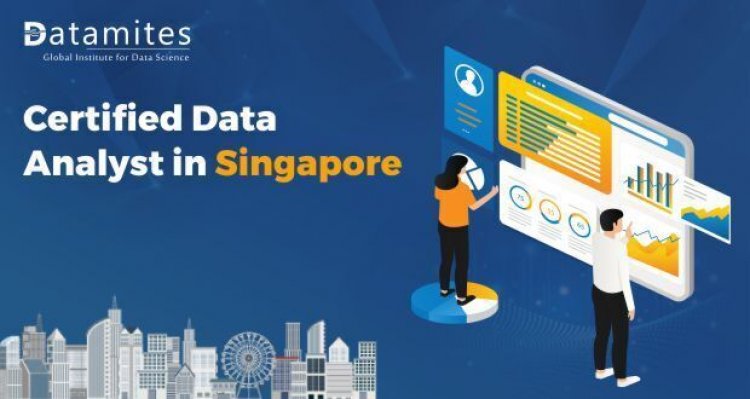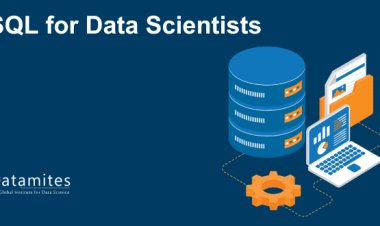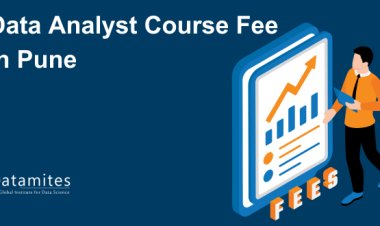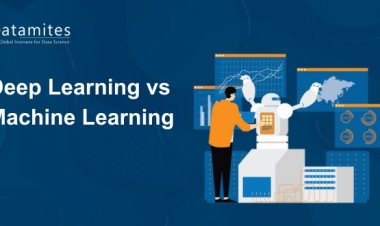How much is the Certified Data Analyst Course Fee in Singapore?

Embarking on a certified data analyst course in Singapore can open up numerous career opportunities. By gaining proficiency in data analysis tools, statistical techniques, data visualization, and data management, you will be equipped to address real-world business challenges and contribute to data-driven decision-making processes. Moreover, certified courses often provide hands-on experience and practical projects that allow you to apply your skills in a realistic setting, further enhancing your understanding and employability.
According to a report by Grand View Research, the global advanced analytics market reached a value of USD 34.56 billion in 2021 and is expected to exhibit a compound growth rate (CAGR) of 21.1% from during the period from 2022 to 2030.
In this article, we will explore the fee structure associated with certified data analyst courses in Singapore. We will discuss the factors that can influence the course fees, the average cost range you can expect, and the benefits of investing in a certified program. Whether you are a recent graduate, an experienced professional looking to transition into data analysis, or someone seeking to upskill in this high-demand field, understanding the course fee landscape will help you make an informed decision about your educational investment.
How to become a data analyst in Singapore?
To become a data analyst in Singapore, you can follow these general steps:
Education and Foundation:
- Obtain a bachelor’s degree in a relevant field such as statistics, mathematics, economics, computer science, or data analytics. This will provide you with a solid foundation in analytical and quantitative skills.
- Consider pursuing advanced degrees or certifications in data science, data analytics, or related fields to enhance your knowledge and credentials.
Acquire Technical Skills:
- Acquire proficiency in programming languages commonly utilized in data analysis, such as Python or R. These languages play a crucial role in data manipulation, analysis, and visualization.
- Familiarize yourself with SQL (Structured Query Language) for working with databases and retrieving data.
- Learn to use data analysis and visualisation tools such as Excel, Tableau, Power BI, or Python libraries like Pandas, NumPy, and Matplotlib.
Gain Practical Experience:
- Seek internships, part-time jobs, or volunteer opportunities that involve data analysis or related tasks. This will provide hands-on experience and demonstrate your skills to potential employers.
- Create a portfolio of data analysis projects to exhibit your capabilities. Engage in personal projects or contribute to open-source initiatives to showcase your problem-solving and analytical skills.
Networking and Industry Knowledge:
- Attend industry events, conferences, and meetups related to data analytics to expand your professional network and stay updated on the latest trends and technologies.
- Engage with online communities, forums, and social media groups focused on data analytics to connect with professionals in the field and learn from their experiences.
Job Search and Professional Development:
- Look for entry-level data analyst positions in Singapore through job portals, company websites, and recruitment agencies. Personalize your resume and cover letter to showcase your pertinent skills and experiences.
- Consider obtaining professional certifications specific to data analysis, such as the SAS Certified Data Scientist or Microsoft Certified: Data Analyst Associate, to enhance your credibility and marketability.
- Continuously update your skills and knowledge by staying informed about advancements in data analytics, machine learning, and other related domains.
Continuous Learning:
Data analysis is a rapidly evolving field, so staying updated with new tools, techniques, and best practices is essential. Explore online courses, tutorials, and resources to continue expanding your knowledge and skill set.
Live-project internship:
- Data analytics professionals can gain hands-on experience through live project internships.
- Live project internships bridge the gap between theoretical knowledge and practical application.
Certifications:
- Validates proficiency and knowledge in the field.
- Demonstrates a commitment to professional development and staying updated with industry best practices.
- Certifications from reputable organizations like Microsoft or IBM hold particular value in the industry.
Resume Preparation:
- Highlighting relevant skills and experience.
- Including technical skills in Python, R, SQL, Tableau, and Power BI.
- Emphasizing experience in data analysis, statistical modeling, and data visualization projects.
- Showcasing a strong understanding of data querying, programming languages, and analytical
Remember that the specific requirements and job market dynamics may vary, so it’s beneficial to research the Singapore job market, connect with professionals in the field, and adapt your approach accordingly.
Read the following articles:
What does a data analyst do?
A data analyst is responsible for collecting, organizing, and analyzing large sets of data to uncover meaningful insights and support decision-making processes within an organization. Their main tasks include:
- Data Collection: Data analysts identify and gather relevant data from various sources, such as databases, spreadsheets, and external APIs.
- Data Cleaning and Preparation: They clean and preprocess the data, ensuring it is accurate, consistent, and ready for analysis. This may involve removing duplicates, dealing with missing values, and transforming data into a suitable format.
- Data Analysis: The data analytics training institute in Singapore specializes in teaching statistical techniques, data visualization, and exploratory data analysis to equip individuals with the skills to identify patterns, trends, and relationships in collected data.
- Data Modeling and Visualization: Data analysts use tools like spreadsheets, statistical software, or programming languages to create models and visualizations that present the analyzed data in a clear and concise manner. These visualizations help stakeholders understand complex information and make informed decisions.
- Interpretation and Reporting: Data analysts interpret the results of their analysis, draw conclusions, and provide actionable recommendations based on their findings. They often create reports, presentations, and dashboards to communicate their insights effectively to non-technical stakeholders.
Data analysts play a crucial role in helping organizations make data-driven decisions, optimize processes, and gain a competitive advantage by uncovering valuable insights from large volumes of data. Having a data analyst job plays a critical role in Singapore and generally, the salary of a data analyst in Singapore ranges from S$60,00,000 per year according to a Talent.com report.
Refer these articles:
- Certified Data Analyst Course Fee in Canada
- Certified Data Analyst Course Fee in Netherlands
- Certified Data Analyst Course Fee in Switzerland
How is DataMites providing Certified Data Analytics Training in Singapore?
DataMites is a renowned global training institute that provides comprehensive data analytics training in Singapore.
DataMites, a reputable global training institute, offers its premium course, the Certified Data Analyst in Singapore. This comprehensive program is designed as a no-code course and covers essential tools such as Excel, MySQL, PowerBI, and Tableau. The online certified data analyst courses provided by DataMites in Singapore have a duration of four months, comprising 400 learning hours, including 20 hours of live-online training. Participants also gain one year of access to Elearning materials. The course is highly regarded, as it has received approval from IABAC, a renowned global organization, enhancing its reputation and industry acceptance. Successful completion of the course results in participants receiving a data analytics certification in Singapore from DataMites.
DataMites provides key features for Certified Data Analyst Course in Singapore as follows:
- Ashok Veda as an expert trainer,
- A specialised course curriculum,
- High-quality study materials,
- Internship opportunities,
- Case studies,
- 1 Client and 10 capstone projects
- Intensive live online training
- Resume Preparation
DataMites provides online data analytics training in Singapore, offering a comprehensive curriculum that blends theoretical concepts with practical applications. The training program is designed to equip participants with the essential skills and knowledge required to excel in the field of data analytics.
Certified Data Analyst Course
What is the DataMites Certified Data Analyst Course Fee in Singapore?
DataMites, a renowned global training institute, offers a variety of data analytics courses, including Certified Data Analyst Courses in Singapore. The institute is known for its transparent and competitive pricing structure in Singapore. Typically, the course fees for data analysts in Singapore fall within the range of S$ 2000 to S$ 3000.
To make their training programs accessible and affordable for aspiring data analysts, DataMites provides various options. These include flexible payment plans, instalment options, and even scholarships. For instance, the certified data analyst course fee in Singapore ranges from S$1,630 but students can avail of a discounted price of S$ 1,023 for live-online training. Similarly, the blended course fee is priced at S$ 1,220, with a discounted rate of S$ 838 available to students.
DataMites strives to ensure that its courses are reasonably priced and offer value for aspiring data analysts in Singapore.
Refer these articles:
- Certified Data Analyst Course Fee in Hong Kong
- Certified Data Analyst Course Fee in Myanmar
- Certified Data Analyst Course Fee in Vietnam
Summary:
The Certified Data Analyst course offered by DataMites in Singapore provides aspiring professionals with a comprehensive training program in data analytics. This course equips participants with the necessary skills and knowledge to excel in the dynamic field of data analytics. Enrolling in this industry-recognized data analytics training course in Singapore enhances career opportunities.
Data Science vs Data Analytics

 Datamites Team
Datamites Team 





